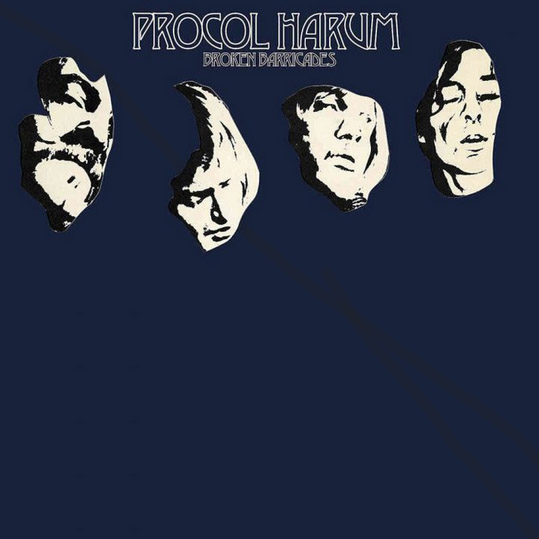The majesty of Gary Brooker’s’ [sic] voice. The wizardry of Robin Trower on guitar. What’s not to like? Well, more than I expected.
Procol’s fifth album gets a remastered brush up and expands into a 3CD set with 36 extra tracks of which 32 are aired for the first time. The eight-song original is supplemented by nine alternate takes and coupled with live recordings from New York, Sweden and Sounds of the 70’s, all from 1971.
The opening tracks of Simple Sister (sometimes called “our heavy metal song” by Brooker) and Broken Barricades are the highpoint, a Procol that is more rock than art. Brooker’s voice remains exceptional, capable of lifting almost any song from ordinary to special. Sister breaks down from a driving Trower riff to simple piano before building again to a full orchestral flourish. Barricades is almost as striking but somewhat simpler and fades out so very very slowly. As does the rest of the album.
Memorial Drive is a busy [sic] but loses it’s [sic] way towards the end, whilst Luskus Delph sounds contrived and overly lush, as if making up for the harder edge of the rest of the album. Power Failure is so nearly restores things [sic] – a vibrant, galloping romp, emasculated two minutes in by an overdubbed percussion solo that may have survived in vinyl but otherwise has the forward button written all over it. Song For a Dreamer is a Trower soundscape 1983 … A Merman I Should Be style tribute to the recently deceased Hendrix that would be better realised on his first solo album (Daydream [sic] is still in his live set today).
The album rallies towards the end – Playmate of the Mouth, a single entendre song title (more on Reid’s dodgy lyrics in a moment) – but deemed Procol’s worst track ever by Brooker. A halfway decent tune in a barroom style, it’s followed by Poor Mohammed closes the album out with some up tempo cowbell and slide guitar, with a Trower vocal. Reid maintains his words set out sympathy for an imaginary Arab subject to savagery and degradation although they could easily be taken a different way.
 The
outtakes provide small variations on the originals – Power
Failure with no fake audience noise (but the same percussion)
whilst Simple Sister is the pre-orchestra mix without vocals.
The fade out on Broken Barricades is even longer and Poor
Mohammed appears again, sans those difficult lyrics.
The
outtakes provide small variations on the originals – Power
Failure with no fake audience noise (but the same percussion)
whilst Simple Sister is the pre-orchestra mix without vocals.
The fade out on Broken Barricades is even longer and Poor
Mohammed appears again, sans those difficult lyrics.
So, whilst we are on the subject. Keith Reid has a way with words, but not always a good way. “Simple Sister, Got whooping cough, Lock her in a cell, Throw the key, Into the sea, Hope she never gets well” or “Tulips lips oh Luskus Delph, Your baking breath breeds body ‘x’, With silken measures try to gauge, The inside sweetness of your cave”. Cave? Later in the same song referred to as “widows crack” and “steaming vat”. According to the excellent booklet notes penned by Roland Clare, Brooker thinks Reid was obsessed by different themes at different times, with sex and violence coming to the fore across Barricades. Important to recall how attitudes have changed since the original release, but crack, vat and cave seem rather adolescent.
The live sets allow listeners to compare the band that recorded the album on the New York set with the version that has Dave Ball on guitar, Alan Cartwright on bass, with Chris Copping moving to organ on the Swedish show.
On CD 2 the live New York set kicks off with Memorial Drive with Trower’s bluesy riffing to the fore, with a more pronounced swing live that lifts it above the album version. Luskus Delph has Trower on bass as there was no guitar on the original and Copping adds organ. Simple Sister has an even harder fuzz guitar opening. There’s also some back catalogue including A Salty Dog and Whaling Stories whilst Barricades and Power Failure from Sounds of the 70s close out the side.
On the final CD Dave Ball shows he can match Trower’s riff opening to Simple Sister, generally providing a more earthy sound. Sister and Power Failure are also included as well as Salty Dog and Repent Walpurgis. All in all it’s a good punchy set despite the slightly slow start in Wee Small Hours of Sixpence.
The most recent Classic Rock magazine considers the bands [sic] essential albums plus those they deem good or ones to avoid. Barricades doesn’t feature in any category. Roland Clare notes “not many fans rate the … album – dark, puzzling, scary …. but it has proved to be a ‘cellar full of diamonds'”. I’m not sure I see that much sparkle.
What does it all *mean*?
In terms of Reid’s lyrics, quotes from the band in the booklet
suggest no-one really knows.
Goes well with …
Carry On Matron
Release Date:
July 5th
Might suit people who like…
The illegitimate offspring of brief tryst between Rory Gallagher
and Jethro Tull. Smiley winkey face.